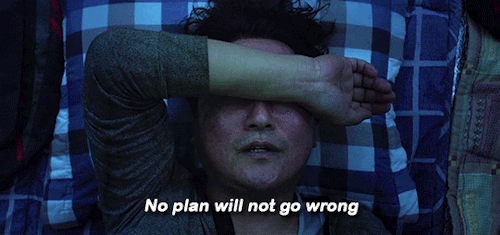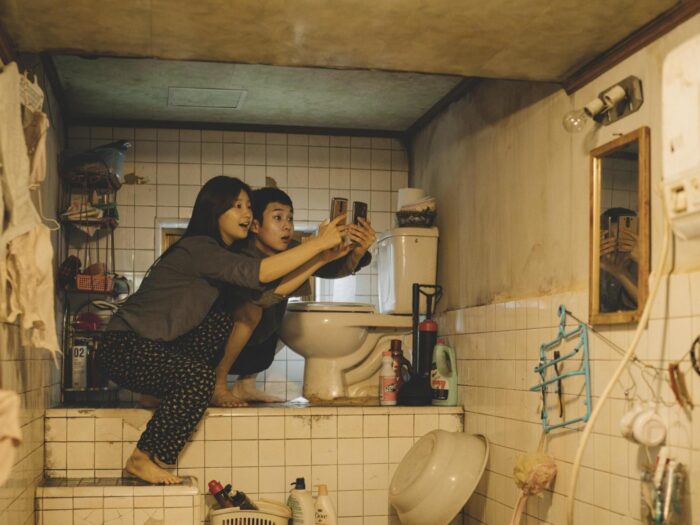
Parasite, the eighth feature length film by Korean director Bong Joon-Ho, quickly gained popularity towards the end of 2019, pushing it forward into winning four Oscars including Best Director and Best Picture. Parasite is a masterful work in almost every way. Its major popularity worldwide is not unwarranted, and its success, in the U.S. especially, will hopefully garner more deserved attention to foreign language films. The film’s exploration of class struggles, capitalism, and the heart of mankind make it all the more relevant in our time. More on this below…
If I had all this, I would be kinder.
– Chung-Sook, Parasite (2019)
Or would you? Parasite is a movie that wants you to be on the “protagonist” family’s side but doesn’t at the same time. It is brilliantly written, crafted, shot, and acted. I have only ever seen one other Bong film, Snowpiercer, and loved it, but this film seems to be on another level. There is a lot to say about this film, and a lot of it has already been said. So, I’ll keep the general stuff as brief as I can and try to draw out some important themes I saw explored in the film.
This film was shot so precisely and intentionally. It is definitely one of the top films that will come to mind in the future when I think about the shots and setting having such an important role in the storytelling and atmosphere of a film. Others have explored this more in depth, but I was just really blown away by the intentionality (without forcing or overdoing anything). The score also adds so much intensity to the film. I loved it! The acting is fantastic. It seems like all of the actors were able to deliver their lines and expressions with such an intricate blend of comedy and tragedy. I’m not sure if there was a single thing out of place or not intentionally crafted in this film. The more I think about it, the more I am blown away. It is definitely a film that blows you away at first watch and somehow still grows in your mind as you get further away.
But what is Bong doing with all of this wonderful film magic? Well, I think that there’s a lot going on. Many people have drawn out themes such as social commentary on results of the state of capitalism, class issues, and more. All of these macro-themes are interesting. There are certainly messages about systematic problems in the film. But I don’t think these are the most dominant (or even most interesting themes). There is a much more personal one that I would like to explore briefly.
Who are the parasites? The Kims? The Parks? The housekeeper and her husband? The rich? The poor? I would venture to say that it is hard to tell. Who is sucking the life out of whom? Who is living off the other? This is why this parasitic theme is so interesting. At the end of the film, Bong forces us to walk away feeling like everyone in the movie was a parasite in one way or another. And since no one really likes a parasite, can we walk away on anyone’s side really? A parasite takes without giving anything in return. A parasitic relationship is one where one body benefits and the other is harmed. What Bong does with this movie is make a web of parasitism so intricately interwoven, that it is impossible to tell where one party is benefiting and the other is harmed. Everyone is trying to live off the others (even within the families), so much so that the net harm may overwhelmingly outweigh the net benefit. This inevitably leads to catastrophe and chaos. We can apply this theme on a macro level and complain about the socioeconomic systems and structures in place in society, and we would be very right in doing so. But I think the more interesting way to apply this theme is to point it inward. What causes this parasitism in the first place? Why do the systems and structures exist? It is because there is an overwhelming selfish ambition that feeds off of each and every one of our hearts. To deny this is to be in denial. This selfishness is a parasite to our own hearts. When we live for no one but ourselves, we not only collapse in on ourselves but we bring others down with us. There is no such thing as a purely personal sin. If we are ever going to solve the systemic problems, we must start with our hearts. We must kill the parasite of selfishness and start living for more than ourselves.
After my second viewing, I still don’t think you can walk away “rooting” for a particular side. However, I think I did sympathize with the poor Kim family more this time around. There is a sense that they are just as crappy people as the Parks (though it looks different), but at least they have a reason to be.

You know what kind of plan never fails? No plan. No plan at all. …there’s no need for a plan. You can’t go wrong with no plans. We don’t need to make a plan for anything. It doesn’t matter what will happen next. Even if the country gets destroyed or sold out, nobody cares. Got it?
– Kim Ki-taek, Parasite (2019)
Another aspect of the film portrays how devastating the generational perpetuation of poverty is. The scene quoted above me really hard on my second viewing. The defeat of the father after decades of being shoved back down in “his place” is seen with such lament as his advice to his own son is basically to give up on life and the world. It sounds a bit much, but in the moment, you really feel that with him. And then you get the ending [SPOILER] where you see the dream sequence of the Kim son and then get dropped back into hopeless reality. Man, does it hit hard.
This was an incredible film. Considering its crafty ingenuity and all too relevant and powerful portrayed message, I must give it 5 Stars. It is definitely the most deserving best picture winner in a long time. This film is going to eat on my brain for a while.





